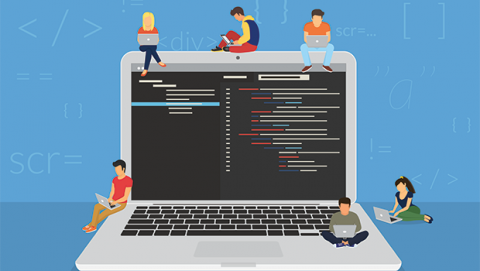Last week, more than 4,000 attendees gathered in Amsterdam for Europe’s largest women in technology conference. And while these influential and inspiring women addressed all the hot topics on the road maps for IT organizations everywhere – artificial intelligence, big data, agile, and DevOps – what stood out to me were the discussions around digital transformation and its impact on society, organizations, and individuals.
Here are a couple of my key takeaways as an attendee and speaker at the 2019 European Women in Technology event:
1. Successful companies must blend human and technological capabilities
We all know digital and AI technologies will continue to change personal lives and workplaces globally. In her keynote presentation, Karalee Close, global leader of Boston Consulting Group's Technology Advantage practice, underscored the benefits for organizations that combine the capabilities of humans and machines in her presentation, “The bionic company – what does the company of the future look like?” Among the advantages are the opportunities to develop superior customer experiences and relationships, more productive operations, and dramatically increased rates of innovation.
[ Get answers to common digital transformation questions and lessons from top CIOs: What is digital transformation? A cheat sheet. ]
Her message was to prepare for this “bionic company” by addressing the four key enablers that allow companies to operate as bionic organizations: digital talent, new ways of working, digital platforms, and data.
As you may suspect, the main barrier preventing leaders from creating bionic companies is not technology, but rather people and processes. Her formula for success – the 10-20-70 formula – states that 70 percent of progress made towards transformation lies with the people and the processes, 20 percent stems from technology, and 10 percent from algorithms.
It’s important to acknowledge there will be disruption as we discuss job loss associated with machines taking on more process and operations. However, to tackle this ongoing transition, the more productive discussions to have center on what talent will be needed in the future.
To be a bit more specific: Operating a process does not require specific talents and can be replaced by machines. However, designing or innovating a new process needs human capacity, skills and knowledge. For me, this means it’s crucial for technology talent to stay flexible and adaptable and to continually be developing and expanding your skills as we move into this bionic era. I also touched on this talent topic during my presentation at the conference, where I spoke about the need for T-shaped skills in IT.
2. Upskilling is essential to disrupt and deliver innovation
A constant theme emerged from all the keynotes and breakout sessions I attended: Upskilling is critical for continual and ongoing innovation. You could gauge attendee interest in the topic by looking around the rooms of sessions that had titles around developing and upskilling talent: They were standing room only.
During a fireside chat, two female founders shared their thoughts on women in Science, Technology, Engineering and Math (STEM). Dr. Ann-Marie Imafidon, CEO and co-founder of a social enterprise promoting women in STEM careers called Stemettes, and Corinne Vigreux, co-founder of the Dutch consumer electronics company TomTom, both launched organizations that inspire and support young women in STEM. Their key message was to continue to lead the change by being a role model for others across the globe. Also, keep in mind that it’s going to take more than technical skills to innovate in the future. As Imafidon said, “I think this should be called STEAM – where the ‘A’ stands for ‘Art.’ I’m a really creative person and technology allows me to be really creative, which is why I think people who like the arts are good at technology.”
Throughout the sessions I attended, a recurring question was: What are the core skills needed for the future? Everyone agreed that technical skills are key, and there was great attendance at sessions on topics such as Blockchain, “Engineering Intuitive Experiences,” and my session on “Agile vs. DevOps: Friends or Foes.” However, it was noticeable how often speakers raised the need for soft skills, which include skills as collaboration, communication, negotiation, problem solving and customer experience (to just name a few).
The conference confirmed yet again that it is important to have a balance of technology and human skills. This takeaway underscored what the DevOps Institute reported in our “2019 Upskilling: Enterprise DevOps Skills Report:" Human skills (soft skills) are just as important as technical skills.
[ Help the DevOps Institute understand the current and future state of DevOps skills in IT: Take the "2020 Upskilling: Enterprise DevOps Skills" community survey." ]
As I ended my presentation and connected with attendees in the speaker corner afterwards, none of the conversations and questions focused on technology. All of the questions I fielded focused on the cultural and people challenges associated with agile and DevOps, rather than technical concerns. The transformations that are necessary across teams, organizations, and society will need to be driven by humans leveraging technology and not the other way around. And while this is just my humble opinion, it was wonderful to hear it validated last week by some of the brightest women in technology.
[ Culture change is the hardest part of digital transformation. Get the digital transformation eBook: Teaching an elephant to dance. ]





